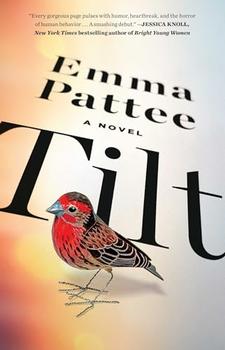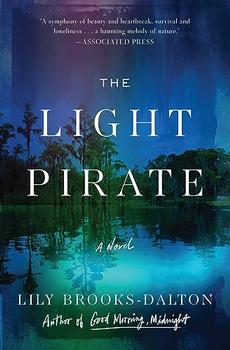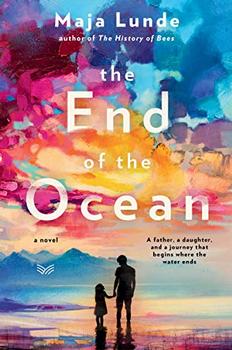Summary | Excerpt | Reading Guide | Reviews | Beyond the book | Read-Alikes | Genres & Themes | Author Bio

A Novel
by Emma PatteeIn Emma Pattee's debut novel Tilt, heavily pregnant Annie is in IKEA looking to buy a crib when a huge earthquake strikes Portland. Buildings crumble, bridges collapse, roads are ripped apart, and the city is swallowed by a cloud of dust and debris. With phone lines down and all power lost, Annie must navigate the chaos in a desperate attempt to reach her husband, who was working downtown. Her first-person account is addressed to her unborn child; as Annie narrates the journey they undertake together, the reader feels how much Annie is trying to remain calm and focused for the sake of her family.
During Annie's trek across the city, she encounters the best and worst of society. Some people rally together, offering comfort, support, and first aid to those in need; others serve only themselves, capitalizing on the chaos to loot, vandalize, and even enact violence on others. It's a context that is ripe for social critique; most significantly, Annie finds it easy to offer help to or accept it from fellow women—like Taylor, a young mother trying to reach her daughter's school, and Becky, a woman badly injured during the quake—but difficult to accept help from men. She's unable to shake her underlying suspicion, her constant awareness of the threat men can pose, even when she could use their help. In one scene, a man puts his hand on her shoulder, trying to offer genuine comfort, but Annie immediately freezes "in the way every woman's body freezes under the pressure of a man's hand." Later, she tells her baby, "You'll know this feeling one day—there's nothing a woman hates more than walking by herself, and hearing a strange noise, or feeling the presence of an 'other.'"
In such a heightened context, Annie is on high alert, constantly assessing situations with men in a way that she doesn't have to with women. The reader feels her exhaustion and frustration at this reality. When a man offers Annie a ride in his van, she tries to reassure herself that his motivations are likely innocent:
"Men aren't necessarily bad. Men are half the population. Men are sometimes willing to help others just to be kind… Every man was once a baby. This man was once a child. He probably is trying to do the right thing… Pregnant women are sacred. Nobody wants to hurt a pregnant woman. Nobody wants to rape a pregnant woman. People have mostly good intentions."
But she can't override her fear, and she doesn't accept the ride.
The chapters detailing Annie's journey alternate with flashbacks to her life prior to the earthquake, a structure that helps break up the tension of the present-day chapters and lets the reader understand more of what Annie has been going through: the grief of losing her mother; the stress of impending parenthood; her strained relationship with her husband, Dom, which has been exacerbated by Annie's pregnancy and money troubles. Annie has also been concerned about the state of society, questioning the ethical implications of bringing a child into a world blighted by inequality, economic hardship, and climate change, and feels a constant undercurrent of dread. "My whole body vibrates with the feeling that something has gone wrong or is about to," she says. "Every day I wake up with the feeling that I've heard bad news—but I can't remember what it was." Her paranoia that something terrible will happen to her child has caused further tension with Dom. "There's no way to explain to your father that some people make lists of all the ways that babies die and some people don't," she tells the baby.
Annie's anxiety about motherhood ramps up the stakes of the disaster. After the earthquake, she must face her worst fears in a very literal sense, and fight to save herself, her child, and her relationship. It's a bold metaphor, but one that never detracts from the realism of the earthquake itself. And though more could have been done to emphasize the bitter irony that Annie's anxieties about the dangers of the world were not unfounded, the immediacy of the situation does grant her a new appreciation for life—both her own, and the one growing inside her:
"My aliveness is beaming out of me, every pore shining with the fact that I'm alive. I'm so fucking alive I'm shaking. We're alive, you and me, we're alive, and that's why I'm running now, running down the trail with my Birkenstocks flopping and my great misshapen belly straining to stay upright."
Annie's story may lack closure for some readers, but as it reaches a thrilling yet abrupt climax, Tilt movingly conveys to readers the importance of carrying on despite the fear of an uncertain future.
![]() This review
first ran in the April 9, 2025
issue of BookBrowse Recommends.
This review
first ran in the April 9, 2025
issue of BookBrowse Recommends.

If you liked Tilt, try these:

by Lily Brooks-Dalton
Published 2024
For readers of Station Eleven and Where the Crawdads Sing comes a hopeful, sweeping story of survival and resilience spanning one extraordinary woman's lifetime as she navigates the uncertainty, brutality, and arresting beauty of a rapidly changing world.

by Maja Lunde
Published 2021
From the author of the number-one international bestseller The History of Bees, a captivating story of the power of nature and the human spirit that explores the threat of a devastating worldwide drought, witnessed through the lives of a father, a daughter, and a woman who will risk her life to save the future.
Don't join the book burners. Don't think you are going to conceal faults by concealing evidence that they ever ...
Click Here to find out who said this, as well as discovering other famous literary quotes!
Your guide toexceptional books
BookBrowse seeks out and recommends the best in contemporary fiction and nonfiction—books that not only engage and entertain but also deepen our understanding of ourselves and the world around us.